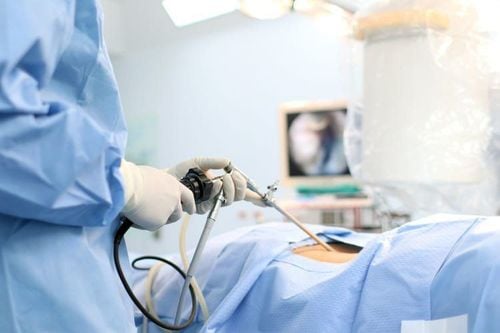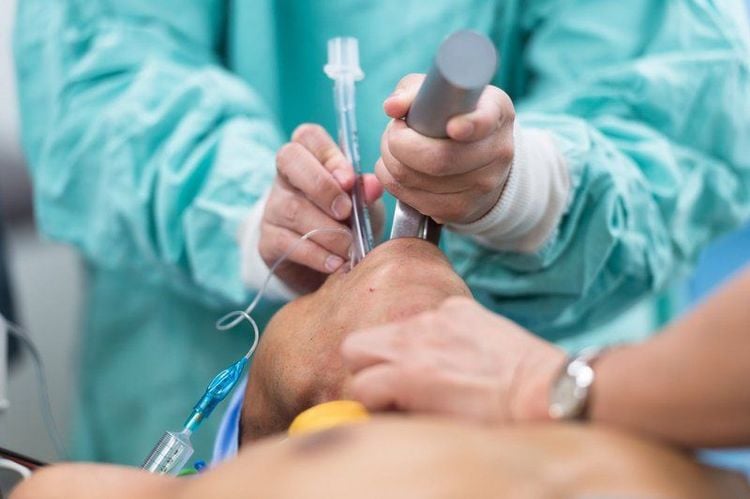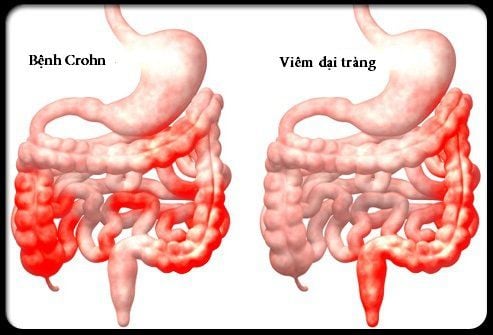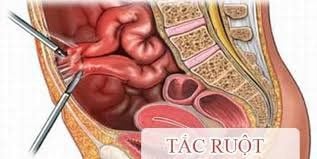This is an automatically translated article.
Small bowel perforation is a perforation of the small intestine that causes the contents of the intestine to leak out. This is a dangerous condition that requires immediate surgical emergency. Laparoscopic surgery to suture small bowel perforation is a timely and effective treatment method for patients.1. Some causes of small bowel perforation
Small bowel perforation usually occurs in the following cases:
The small intestine has an invasive tumor causing intestinal perforation. Tumors are usually lymphoma, metastatic renal carcinoma, or intestinal mucosal fibrous tissue; The small intestine is twisted leading to intestinal distension, compression of blood vessels and intestinal perforation; Deep trauma to the lower abdomen: The small intestine is most susceptible to perforation during trauma because it is an internal organ that rolls along the abdominal wall, occupying most of the abdominal cavity; Treatment of cervical cancer and intra-abdominal malignancies can cause intestinal obstruction and perforation; Complications of intestinal perforation after kidney transplantation due to the use of high doses of immunosuppressive drugs in the postoperative period; Ingestion of chemicals can lead to acute intestinal perforation and peritonitis, which may appear 4 days after acid exposure; Ingestion of foreign bodies: Toothpicks, sharp bone fragments, ... When the small intestine is punctured, the fluids and food in the intestines leak out. They are the cause of peritonitis, abscess, intestinal fistula.
2. Learn the method of suturing small bowel perforation by laparoscopic surgery

phương pháp khâu thủng ruột non bằng phẫu thuật nội soi giúp phụp hồi nhanh
Patients with small bowel perforation will have laparoscopic surgery, small bowel perforation suture, abdominal lavage and abdominal drainage. If there is nothing abnormal, the patient is expected to be discharged after 3-4 days of treatment.
2.1 Indications/contraindications Indications
Patients with small bowel perforation due to pathology; In patients with small bowel perforation due to blunt abdominal trauma, there may be multiple perforations. Contraindications
Patients with old age, weak health, shock due to infection or respiratory failure do not allow intra-abdominal inflation; The patient has a history of multiple abdominal surgery; Patients with metastatic cancer to the peritoneum and distant metastases. 2.2 Preparing for surgery Personnel performing: Gastrointestinal surgeon, anesthesiologist, anesthesiologist; Technical facilities: The operating room has enough equipment for trans-abdominal laparoscopy, laparoscope (including monitor, camera, light source and CO2 source), unipolar and bipolar electric knife system, ablation knife. supersonic; pumping system - washing and sucking peritoneal fluid; tools to remove liver, clamp intestines, forceps, pins, laparoscopic scissors; Patients: The surgery was explained thoroughly, basic tests were performed (biochemistry, hematology and coagulation function); get chest x-ray and electrocardiogram, commit to surgery; Medical records: Prepare according to prescribed procedures.
2.3 Performing surgery

Thực hiện gây mê nội khí quản cho bệnh nhân
Check the records and check the patient, make sure the right person, the right disease; Anesthesia: Perform endotracheal anesthesia; Patient position: supine, legs closed, urinary catheter placed; Doctors and assistants stand in suitable positions convenient for the procedure; Place trocar: Place 3 - 4 trocars (1 trocar 10mm placed close to the navel, 2 trocars 5mm placed in the right iliac fossa and left iliac fossa, an additional 5mm trocar can be placed if necessary); Assessment of injury: Observe the abdominal tube, fluid volume, bleeding status, can check solid organs such as liver, spleen, pancreas and kidney (if trauma). At the same time, promptly use intestinal clamps, check the stomach, colon, small intestine, combine with suction to clean up the fluid, send for culture and make antibiotic chart; Abdominal lavage: After finding a hole in the small intestine, rinse the abdomen with warm 0.9% NaCl solution; Treatment of small bowel perforation; Perforation due to pathology: Trimming the perforation margin to make pathology; Small intestinal perforation: Laparoscopic suture with 1 X-shaped stitch; Large small bowel perforation or multiple perforations far apart: Perform laparotomy 2 - 3cm, bring out the loop of intestine, suture horizontally with slow target; Many small bowel perforations of large size, located close to each other: Perform a laparotomy 2-3cm, bring out the loop of intestine. Next, cut the segment of intestine containing the perforation, reconnect the 2 parts and reintroduce them into the abdomen; Drain the abdominal tube and close the trocar holes. 2.4 Post-operative monitoring Monitor vital indicators such as blood pressure, respiration, temperature, pulse,...; Monitor infection, bleeding; Patients save gastric tube, use a combination of at least 2 antibiotics for 5-7 days. 2.5 Complications and management Complications in surgery: Common is bleeding due to damage to blood vessels. Treatment measures are stitches to stop bleeding or with clips. In case of not being able to stop bleeding, it is necessary to switch to open surgery to avoid causing large hematoma in the mesentery; Complications after surgery: Bleeding in the abdomen: The treatment is early re-operation to check and stop bleeding; Stitching or anastomosis: Need to be treated with early re-operation; Narrow stitches or anastomosis: Should re-operate to completely solve the cause. Perforation of the small intestine by laparoscopic surgery is an emergency procedure, preventing the risk of serious complications. Therefore, when there are warning signs of small bowel perforation, the patient should immediately go to the hospital for timely examination and treatment.
Any questions that need to be answered by a specialist doctor as well as customers wishing to be examined and treated at Vinmec International General Hospital, you can contact Vinmec Health System nationwide or register online HERE.











